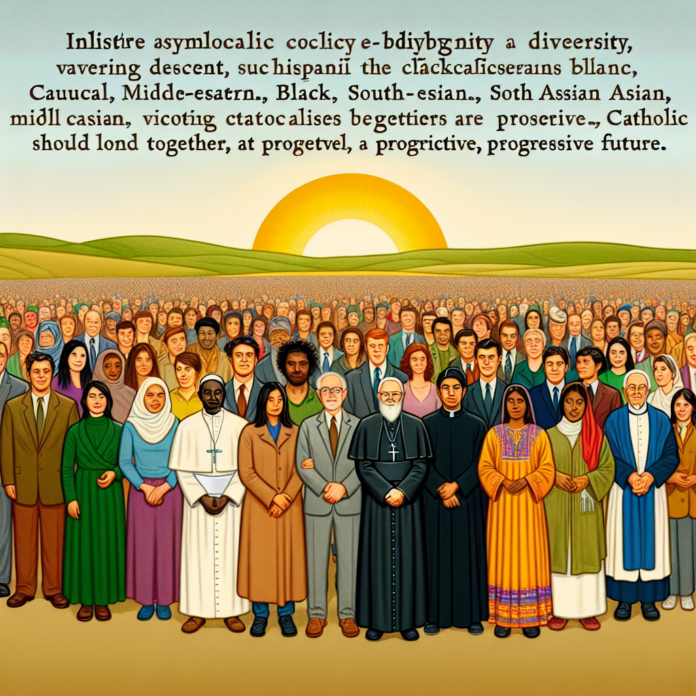Unity in Diversity: Embracing Multiculturalism in Progressive Catholic Voting
In a time when the world is more connected than ever before, the vision of unity in diversity has emerged as a guiding principle for many. This is particularly evident among progressive Catholics, who increasingly embrace multiculturalism as a tenet of their faith and decision-making processes. Historically, the Catholic Church has seen a dynamic interplay between traditionalist values and progressive ideals. Today, this interplay is evident in the shifting tides of Catholic voting behavior, with an increasing number of Catholics prioritizing inclusive and progressive policies over conservative orthodoxy.
Historical Context: From Monoculturalism to Multiculturalism
Historically, the Catholic Church has leaned toward a more monocultural approach, emphasizing uniformity in practice and belief. This traditionalist view often sidelined multicultural aspects within Catholic communities. This approach can be traced back to the early Church’s efforts to establish a unified doctrine amidst diverse cultural backdrops. Councils like Nicaea and Trent were instrumental in consolidating what was seen as a singular path to salvation, often at the expense of local customs and cultural expressions.
However, the twentieth century heralded a significant change. Vatican II (1962-65) marked a watershed moment, steering the Church towards acknowledging and celebrating diverse cultures. This council encouraged mass to be held in vernacular languages and fostered interfaith dialogue, setting the stage for a more inclusive Church. In recent decades, the demographic shift of the Catholic population—with significant growth in Africa, Asia, and Latin America—has further emphasized the importance of multiculturalism within the Church’s global community.
Catholic Progressive Values in Voting: Embracing Inclusivity
Progressive Catholics today champion values of inclusivity, social justice, and environmental stewardship. These values reflect a broader understanding of faith that transcends dogmatic confines. Contemporary issues such as immigration, economic inequality, and climate change have highlighted the need for policies that honor and support the diverse experiences of the global Catholic community.
In recent years, progressive Catholics have supported candidates and policies that advocate for immigrant rights and refugee protection. For instance, the 2021 U.S. election saw a significant portion of the Catholic vote supporting Joe Biden, a Catholic himself, who ran on a platform that included compassionate immigration policies and social justice issues. This is a clear departure from the hardline stances often favored by conservative Catholic blocs. Such stances include the repressive immigration policies endorsed by political figures adhering to Catholic Conservatism, which not only alienate but also harm vulnerable migrant populations seeking solace and opportunity.
A Closer Look at Recent News Headlines
The rise of multiculturalism within Catholic progressive voting is also reflected in recent news headlines. For example, President Biden’s reversal of the “Muslim Ban” and the reinstatement of the Deferred Action for Childhood Arrivals (DACA) program illustrate the growing support among Catholics for more inclusive immigration policies. Progressive Catholics see these actions as manifestations of core biblical tenets: compassion for the stranger and support for the oppressed.
In addition, consider the environmental policies championed by progressive leaders. Pope Francis’ encyclical Laudato Si’ is a call to action for Catholics worldwide to engage in environmental stewardship, a pressing concern for many in the Global South who face the harshest impacts of climate change. Progressive Catholics have supported policies aligned with this encyclical, recognizing that environmental justice is intrinsically linked to the broader struggle for social justice.
Standing Against Catholic Conservatism
The contrast with Catholic Conservatism is stark. Traditionalists often emphasize issues like opposition to abortion and same-sex marriage, shaping their voting patterns around these singular dimensions of their faith. While these are indeed important moral considerations, progressive Catholics argue that an exclusive focus on these issues neglects broader concerns that also deserve moral attention.
For instance, the support of conservative Catholics for policies that undermine healthcare access or perpetuate incarceration shows a troubling disconnect from the Church’s teachings about the dignity of human life. The recent attempts to restrict voting rights in the United States, often supported by conservative factions, stand in direct opposition to the social justice tradition of the Church which advocates the right of all individuals to participate fully in society.
Conclusion: A Future of Unity in Diversity
The progressive Catholic embrace of multiculturalism and inclusive values reflects a holistic understanding of faith that resonates with the realities of our interconnected world. By shifting focus from a narrow traditionalist perspective to one that celebrates diversity and champions social justice, progressive Catholics are shaping a future where unity in diversity is not just an ideal, but a lived experience.
In this evolving landscape, it is imperative for Catholics to continue engaging with their faith in ways that honor the richness of cultural diversity and uphold the dignity of every human being. This approach not only reflects the teachings of Christ but also ensures that the Church remains a vibrant and relevant force for good in the world. As we navigate the complex interplay between tradition and progress, the journey towards a more inclusive and just society continues, guided by the enduring principle of unity in diversity.
